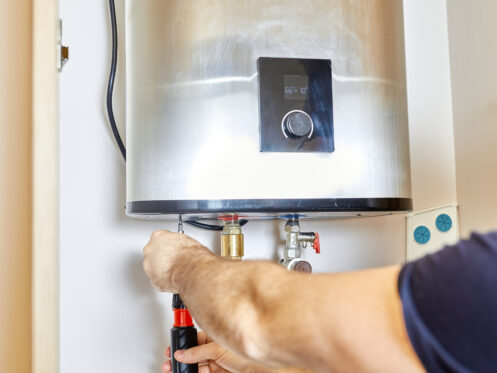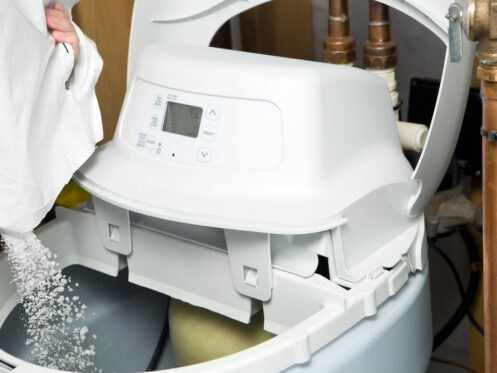Tankless water heaters are an excellent water heating solution for Jacksonville, FL, homes. If you’ve never owned one, you’ll love their ability to provide endless hot water. You’ll also love their superior energy efficiency. However, like all machines, tankless water heaters can occasionally suffer from performance and mechanical issues. In those situations, it helps to know about some of the more common problems tankless heaters suffer. Here are five of them and how to solve them.
1. Scale Buildup
Here in Jacksonville, hard water is an issue in almost every home. Unfortunately, hard water is especially problematic for tankless water heaters. It’s advisable to install a water softener to go with a tankless heater here to avoid problems. Your tankless heater will inevitably suffer from scale buildup issues if you don’t have a water softener. When that happens, your tankless will suffer reduced efficiency and diminished flow rates.
The good news is that descaling a tankless water heater isn’t difficult for a professional plumber. They’ll use a slightly acidic descaling solution and cycle it through the tankless heater. That dissolves the scale deposits so that they flush harmlessly out of the system. They’ll also clean out the system’s screen filter, which also picks up mineral deposits. Without a water softener, your tankless heater may need descaling every three months. With one, you should still have descaling performed as part of your yearly maintenance routine.
2. Cold Water Sandwich
Although tankless water heaters produce endless hot water, it doesn’t happen instantaneously. That often leads to a phenomenon called a cold-water sandwich. That refers to a situation where your water supply goes from warm to cold before turning into the hot water you expect. You’ll most likely experience the problem when using hot water frequently. When you first open a tap, you’ll receive leftover hot water that remains in your home’s plumbing. Then, you get the cold water that passes through your tankless heater as it begins running. Eventually, the system catches up and gives you hot water.
You can eliminate cold water sandwiches by installing a water recirculation pump. That redirects leftover hot water in your plumbing back through your tankless heater. As a result, you’ll experience a smooth temperature increase in your water when you open a tap. Some tankless heater models have built-in recirculation pumps and buffer tanks. However, they’re a relatively recent innovation, so you likely won’t have one unless yours is brand-new.
3. Blocked Exhaust Vent
If you have a tankless water heater serving your whole home, it likely relies on a natural gas burner. Just like a furnace, that burner requires a vent to expel combustion byproducts to the outdoors. If that vent gets blocked, your tankless heater will stop working. On most models, the problem results in an error code. You can find the explanations for your system’s error codes in its owner’s manual.
If you have an error code indicating a vent issue, you should inspect the system’s vent pipe. First, look at the indoor portion to see if there are any holes or damage. If not, look at the outdoor part of the exhaust pipe. Ensure nothing is blocking the outlet and that there isn’t anything inside the pipe. It isn’t uncommon for birds, insects, and rodents to nest in exhaust pipes. For them, it’s simply a warm place to rest.
4. Ignition Failure
Another common tankless water heater issue is an ignition failure. Most often, the problem results from one of three causes. The first is a blocked vent, which should trigger the same error code discussed above. In that case, clearing the vent should solve the problem. The second cause is a gas supply problem. If your home has other gas appliances and they’ve stopped working, too, contact your gas supplier for help. If your other gas appliances still work, check the gas line valve leading to your tankless heater. It should be fully open when your system is in operation.
The third potential cause of ignition failure is a problem with your tankless heater’s ignition components. Unfortunately, that’s not something you can deal with yourself. One of our technicians can diagnose and solve the problem for you. A typical physical cause of an ignition failure is a dirty flame sensor. That’s the component that tells the system when it succeeded in igniting its fuel supply. When the sensor gets dirty, it can’t detect flame, triggering a gas supply interruption. The idea is to prevent gas leaks after an unsuccessful ignition. A damaged ignitor may also cause a similar problem. In that case, the flame sensor detects a lack of ignition and interrupts the gas supply.
5. A System Overload
While tankless water heaters supply hot water for as long as you need it, they have maximum flow rates. When you selected your tankless water heater, one of the deciding factors should have been its flow rate. Your needed flow rate depends on how many places you plan to use hot water simultaneously. For example, if you want to shower while running your dishwasher and washing machine, you’d add up the flow rates of those three things. Your tankless heater must be capable of that total flow rate to use all three at the same time.
If you exceed your tankless heater’s flow rate, some locations may not get the hot water they need. Sometimes, your tankless heater may shut down to prevent damage from excessive demand. Reducing your demand should allow you to reset your tankless heater to restore its operation. If you don’t want to reduce your demand, there’s one more option.
You can install additional tankless heaters to meet your home’s demand. One way to approach this is to install a second heater in parallel with your existing one. Both heaters share the load and double your potential hot water flow rate in that configuration. The other option is to install smaller, point-of-use heaters to serve specific appliances. For example, you might use an under-sink heater to supply hot water to your dishwasher. That would make your dishwasher independent from your central tankless heater.
Local Tankless Water Heater Experts
Buehler Air Conditioning & Plumbing has been the go-to plumber Jacksonville homeowners trust most since 2010. With a customer base of 5,000 that grows every day, we have your neighbors’ seal of approval. Our plumbers have ample training and on-the-job know-how. We also sell, install, and service tankless water heaters from today’s leading manufacturers. We offer financing options on approved credit if you need help affording a new tankless heater. Plus, we’re a recipient of the Angi Super Service Award, so you can count on us to deliver quality work.
We’re also Better Business Bureau accredited with an A+ rating. That reflects our commitment to outstanding customer service. Our long list of glowing customer reviews backs that up. So, if you need someone to troubleshoot the tankless water heater in your Jacksonville home, call Buehler Air Conditioning & Plumbing today!




